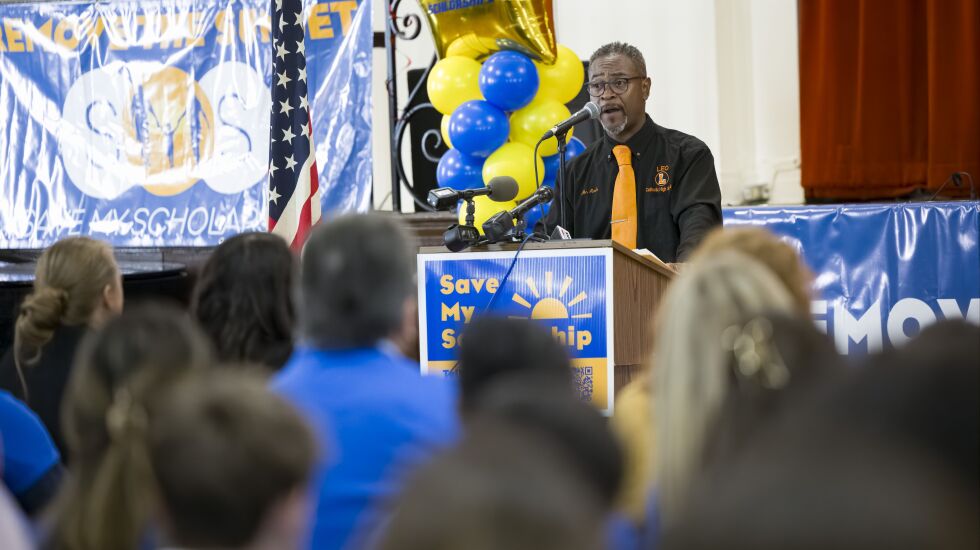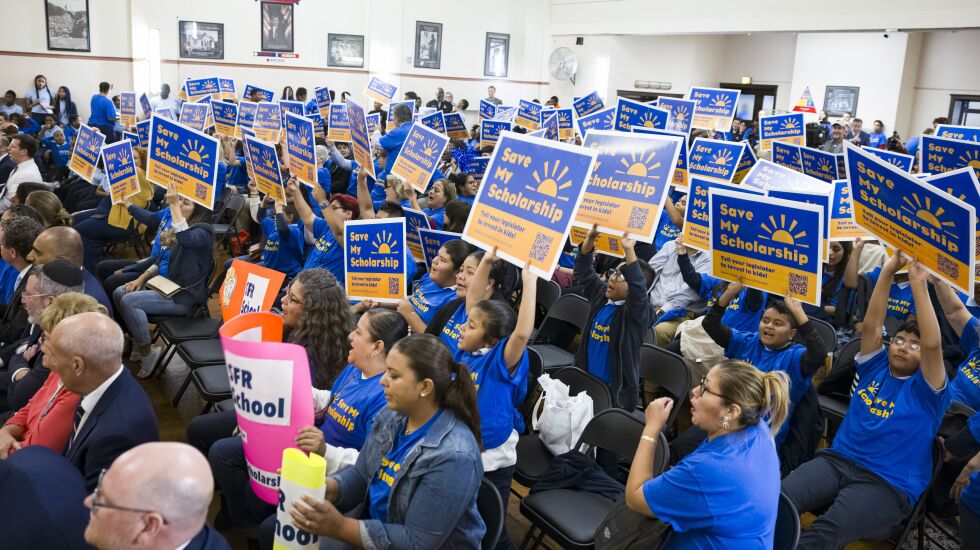
Private school leaders, students and parents gathered on Wednesday to fight for a private school scholarship program that appears to be on the chopping block.
Unless lawmakers extend the Invest in Kids program, slated to sunset on Dec. 31, advocates say about 9,500 students from low-income families will be in jeopardy of losing their private school scholarships.
“Families should have the ability to choose the right school, especially those from low-income communities of color,” said the Rev. Michael Pfleger, longtime pastor of St. Sabina Catholic Church. “If legislators don’t do their job and vote to continue the program, children will be hurt, and their education disrupted.”
Backed by Republican lawmakers and local religious leaders, the program was ultimately slipped into what became the school funding bill in 2017 — which was intended to put new money for education into the state’s poorest and neediest districts. The Invest in Kids Act provides a tax credit of 75 cents for every dollar donated to fund scholarships for Illinois students from low-income families to attend private schools.

Teachers unions have fervently opposed the program, saying the state shouldn’t provide tax credits for individuals to fund private educational institutions until it fully funds Illinois public schools.
But for many students, it has provided a school alternative. Theantae Jones, a senior at Leo Catholic High School, said the scholarship gave him the opportunity to attend a better school than the public school near him. Jones said he commutes from the West Side to the South Side during the week.
“Every morning I start my day at 5 a.m., and I leave the house at 6 a.m. for an hour and half commute,” Jones said. “I do my homework on the bus, miss out on sleep. I make the sacrifices to attend Leo [High School] because it’s the best place for me.”
The program has its share of opponents. Cassie Creswell, director of Illinois Families for Public Schools, argues there is no data reported by the Illinois State Board of Education to compare the standardized test scores of students in private schools versus those in public schools.
“Public funds are for public schools that serve everyone,” Creswell said. “And there’s really just not the same sort of overview and accountability and regulation of these schools, even though they’re getting millions of public dollars.”
Lawmakers left Springfield in late May without extending the sunset provision on the scholarship program, meaning it will end on Dec. 31 unless action is taken during the veto session, which begins Oct. 24.
Gov. J.B. Pritzker in July gave advocates for the program some hope — despite calling it a “really bad idea” when he ran for governor in 2018.
“I’m willing to work with the program if it gets extended or to figure out how we would wind down the program if it doesn’t get extended,” Pritzker told reporters in July.
Pritzker’s noncommittal statement means he won’t be actively working to kill or support the program. In the past, it had been used as leverage during bill negotiations.
But teachers unions this year requested that Illinois Senate President Don Harmon and Illinois House Speaker Emanuel “Chris” Welch carry the program in a standalone bill and not include it in a budget bill, making its passage even more difficult. That would have been a risky move, with primary elections approaching and lawmakers’ votes being picked apart, according to a Democratic lawmaker with direct knowledge of the bill.
There have been discussions about enacting a wind-down period so as not to negatively affect the children already enrolled in the program, the lawmaker said.
Illinois Senate Republican Leader John Curran, R-Downers Grove, is among those fighting to keep the program alive. Curran said Senate Republicans are committed to making the program permanent during the veto session.
Chicago Teachers Union President Stacy Davis Gates last week faced criticism after confirming that she sent her eldest child to a private high school.
In an interview with WBEZ, Davis Gates said she is critical of school choice initiatives that take away money from public schools and blamed them partly for a lack of resources available to neighborhood schools.
She also defended her decision to send her son to a private school, saying it was the result of “unfair choices” she and other South and West Side parents face.







